
The Jerusalem Municipality began a strike in the various services this morning to protest Treasury conduct, claiming the Treasury refuses to transfer the "Capital Budget" owed it.
The municipality opened the strike with the following statement: "We regret that the Finance Ministry engages in false media spins instead of reinforcing Jerusalem. The Capital of Israel's challenges are the nation's challenges and they do not have to come at the expense of Jerusalem's residents.
"While all the other cities supported by the State receive state balancing grants, the law determines that Jerusalem is entitled to a capital grant that the Treasury is withholding from Jerusalem this year for irrelevant reasons. The Treasury's lies notwithstanding, [Jerusalem Mayor Nir] Barkat's entire tenure has been marked by no Jerusalem municipality deficits and has also won prizes from the Interior Ministry on sound financial management and fully transparent conduct."
The municipality further notes that Barkat "adamantly refuses the Treasury's demand for a yearly property tax to be levied on Jerusalem residents, the highest in the country, harming more resident's services, and he believes that Jerusalem has deteriorated for many years due to the Treasury's policies.
"We regret that the Treasury is hiding a number of significant facts from the public:
- The government requires that Jerusalem grant property tax exemptions totaling ₪700 million that grow rapidly year to year, while the Finance Ministry disburses no compensation to the municipality. This means further reducing services for Jerusalem residents and increasing poverty rather than eliminating it;
- The ratio of social workers to poor Jerusalem residents is one-tenth that of Tel Aviv;
- The ratio of sanitation workers per every Jerusalem resident is half that of Tel Aviv;
- The budget allocated for Jerusalem resident services is 25% lower than the major cities average, and is half that of Tel Aviv;
- Jerusalem has been lacking 3,800 classrooms for decades [sic] and the Treasury refuses to fund their construction. The municipality itself raised a billion shekel loan for their construction, but has not received government approval for this, either."
The municipality concludes its response: "Many partners are combating the Treasury for the sake of Jerusalem's future including municipal workers, the Histadrut, parent's unions, community administrations throughout the city, and all who love Jerusalem. The Finance Ministry must decide whether it considers Jerusalem to be the backyard of the State of Israel while our enemies are also trying to weaken it, or as a leading capital whose positive trends of recent years expressed in the fields of culture, education, economic development, and employment need a boost. Jerusalem must be above any other consideration."
Moshe Leon, a Jerusalem administration member holding the community administration portfolio, has in recent days conducted negotiations with the Finance Ministry in the name of Mayor Barkat in an attempt to resolve the crisis. In an interview with Arutz Sheva he said:
"I am working to prevent the crisis expected to begin Sunday; Jerusalem deserves a budget just like all the other cities. As is known, the city budget contains a yearly built-in deficit made of hundreds of millions in exemptions among both property taxpayers and the various houses of worship, such that there is a substantial lack of budget revenue, with the government transferring a significant amount to cover the deficit every year. Unfortunately, the budget approved for 2017-18 does not include Jerusalem and so now there is no budget. If, G-d forbid, we do not receive the full amount from the government, it will mean the dismissal of hundreds of workers."
Leon expressed hope that despite the many tax exemptions granted to residents, Jerusalem will ultimately meet its needs: "We are making all efforts to increase the city's independent income; the city's new business district should bring a lot of revenue and we hope that the built-in deficit will shrink."
The Hebrew interview with Mr. Leon can be heard here: